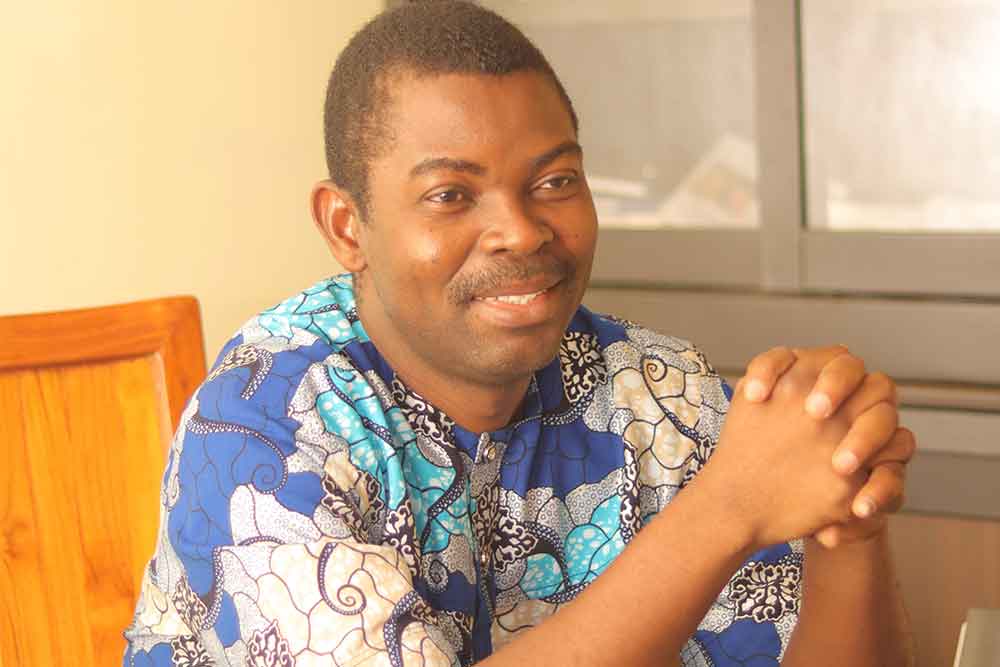
Courtesy of Patron Henekou.
Patron Henekou is a poet, playwright, literary translator, co-founder and director of Festival International des Lettres et des Arts, and professor of English at Université de Lomé in Togo. He has been a Fulbright fellow at the University of Nebraska’s creative writing program and an African American fellow at the Palm Beach Poetry Festival. His recent works include Des cheveux et des ongles (poetry) and Vendredi soir sur la 13 (short stories). He is also curating Zócalo’s April poetry selections, so we sat down in the green room to discuss some of his favorite West African poets, how he got the nickname “Diablotin” as a very studious child, and his appreciation for jazz.
Which poems or poets have influenced or stayed with you?
There are quite a number of poets I love. I was just posting on Facebook about Akpalu Vinoko, who, in living memory, is arguably the greatest poet in the Ewe community (covering Ghana, Togo, and Benin). And Akpalu Vinoko would be maybe my first mentor. Also, Kofi Anyidoho and Kofi Awoonor, who compose their poetry in Ewe, mostly, and write about the cultural flavors and tenets of their community. Kwame Dawes is at the University of Lincoln, Nebraska, and he writes in English—you can feel the Ghana and Jamaica mystics dear to his heart. And Cossy Guenou, who is very important in the poetic landscape of Togo. Among contemporary poets, I can name a couple: Anas Atakora, Renaud Dossavi, Kokouvi Dzifa Galley, Kokou Kpami. I have quite a number of poets in Togo and outside of Togo—[Zócalo poetry editor] Connie Voisine for example, is one of the poets I read—whose works I like and who stay with me.
How do you procrastinate?
I have a lot of things to do each day—in addition to my teaching, I write poems, and I’m currently the director of the university library and archives. But I think it all depends on what comes up, and what needs to be done, and what is urgent. If I’m tired, above all, I’ll just sleep. Or I’ll go and play football. If I start doing that, there is nothing else I can do.
Did you have any childhood nicknames?
One was “Yasminas”; I don’t know what it means. My elder brother gave me that name. And another was “Diablotin,” which is “little devil.” This name was given to me by some children in a higher class [grade] than me, who for one reason or other got to know about my hard work. To tease me they would call me “little devil” because I would do my work quite intelligently.
How has the pandemic affected the way you view poetry?
In our region, in Togo and most West African countries, the cultural sector suffered a lot from the COVID pandemic. It was the first group to be hit, because gatherings and activities were prohibited, and the cost and access to Internet made it difficult to organize online events. But the pandemic also offered an opportunity for creation because we were the first to stay home. Staying home pushed us to more reading, and to more creation. I wrote my next book during the pandemic. The book is an account of my stay in the U.S.
Where did you write the book?
The majority of the text was written in my bedroom, and maybe parts on the first floor, which is uncompleted. I would spend part of the day writing in the uncompleted part of the building, and at night, I would write in my bedroom. And the rare opportunity that I got to sneak onto campus, I would write some text in my office.
Where would we find you at 10 AM on a typical Sunday morning?
Three places. In the car washing bay, to tidy up my car. And if I don’t play on Saturday afternoon, I will go play soccer with my friends. Or I will be on my building site—I’m building my small house—to see how the construction is advancing.
If you could have any superpower, which would you choose?
Depriving human beings of power. Because I think power is one of the commodities that’s engendered inequalities.
How do you decide if you’re going to write a poem in French or English?
I actually don’t decide. When it comes to English or French, the poems come in the language they want to be. I choose when I want to write in Ewe, and the poem comes when I choose to write. In West Africa, particularly with our post-colonial situation and the borders that surround us, the borders that divide us—this landscape exists in my mind, too. So it’s not easy to shift from English to French and from French to English. The compartments are there.
What surprises you most about your life right now?
I have not yet fallen in love—I don’t know if I’ve experienced the heights of falling in love yet.
What’s the last live performance you saw?
I went to the theater last week—last Saturday. And I’m going to watch a jazz performance this evening. It’s one of my favorite jazzmen at the moment, a young Togolese jazzman who is very, very talented—Kossi Mawun, performing at the Togoville Jazz Festival.
Do you have a favorite jazz album?
John Coltrane’s Soultrane.



